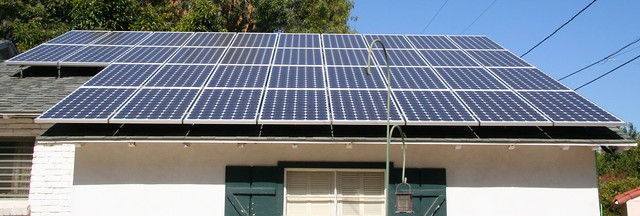 |
| Photo by Clownfish |
This all comes back to one of the major problems with solar energy in particular and renewable energy in general, and that is the lack of knowledge and information about these incredibly powerful alternative forms of energy. While this problem is gradually being addressed as more and more people track down the information they need, it's still not as readily available as it could, and should, be.
So, let's go some way to redressing this situation and give some answers to the question "Are there any problems with solar power?".
Basic Understanding
As already mentioned, one of the major obstacles to the widespread embrace of solar power is the lack of knowledge of just how it works. Most people, if asked the question, "What does solar power mean to you and what can you tell me about how it works?", would probably answer that it's all about having solar panels put on your roof and getting electricity as a result.
Well, that's part of it, but what about the type of electricity that solar panels generate? How do the solar panels actually generate that electricity? If you're connected to the grid, how does the electricity get to the grid and then to your appliances? etc.
There are myriad questions surrounding solar power, and its use, but how many people have the answers to these questions to be able to make an informed decision as to whether or not they might be able to benefit from solar energy themselves? The answer, sadly, is probably not as many as there should be.
Initial Investment
There's no denying that purchasing a PV (photovoltaic) system can be a fairly expensive undertaking, but what most people fail to take into account is that this is not an investment that will help them turn a profit overnight and then they can move on to the next investment opportunity. This is an investment in their - and the environment's - future that will repay the initial cost manyfold in both tangible and intangible ways.
The most immediate benefit will be to the environment, because the home with a PV system will draw less power from the grid, meaning fewer fossil fuels burned, and, therefore, less pollution. The long-term benefit for the homeowner will be that, once the system's paid for itself, usually within 5-10 years, they will be getting their electricity free of charge, and that electricity will be there each and every day from when the sun rises to when it sets.
The Nighttime's NOT The Right Time
And there is another of the problems with solar power, the fact that there's only so much sunlight each day. Granted, depending on where you live, such as areas like the so-called Sunbelt states in the U.S. (including Florida, Arizona, New Mexico, etc.), you could receive massive amounts of sunlight during the day, especially in the summer months.
But, still, night comes, and then what happens? How do you get electricity from your solar panels then? Well, the answer is, you don't. Once night time hits, or it's very cloudy or overcast, solar panels generate little or no electricity, so, if you're on the grid, that's when you draw power from the grid. The great thing here, though, is that, with grid-tied systems, your solar panels have been feeding energy into the grid, giving you "credits", during the day, which you can then withdraw at night. If you're off-grid, you need batteries to store energy, which you then draw from at night.
So, the answer to the question, "Are there any problems with solar power?" is "Yes, there are". But, the good news is that these problems are far from insurmountable, and, with greater knowledge and awareness, what once were seen as problems can eventually be seen as benefits.
Grab your FREE report, and click here to look for more answers to the question, "Are there any problems with solar power? Ray Boreham suggests you'll find a wealth of information and tips on solar and renewable energy at http://www.all-you-need-is-solar.com/
Article Directory: EzineArticles
|

No comments:
Post a Comment